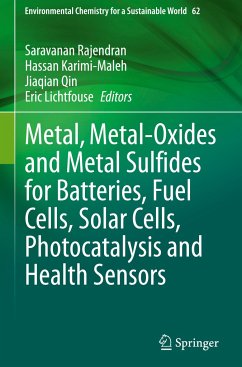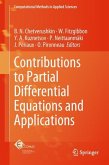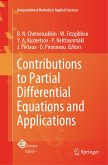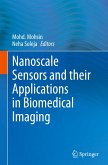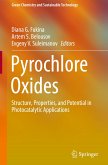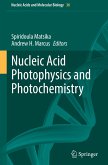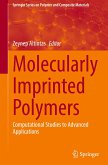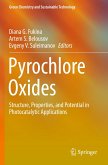Metal, Metal-Oxides and Metal Sulfides for Batteries, Fuel Cells, Solar Cells, Photocatalysis and Health Sensors
Herausgegeben:Rajendran, Saravanan; Karimi-Maleh, Hassan; Qin, Jiaqian; Lichtfouse, Eric
Metal, Metal-Oxides and Metal Sulfides for Batteries, Fuel Cells, Solar Cells, Photocatalysis and Health Sensors
Herausgegeben:Rajendran, Saravanan; Karimi-Maleh, Hassan; Qin, Jiaqian; Lichtfouse, Eric
- Gebundenes Buch
- Merkliste
- Auf die Merkliste
- Bewerten Bewerten
- Teilen
- Produkt teilen
- Produkterinnerung
- Produkterinnerung
This book summarizes recent findings on the use of new nanostructured materials for biofuels, batteries, fuel cells, solar cells, supercapacitors and health biosensors. Chapters describe principles and how to choose a nanomaterial for specific applications in energy, environment and medicine.
Andere Kunden interessierten sich auch für
![Contributions to Partial Differential Equations and Applications Contributions to Partial Differential Equations and Applications]() Contributions to Partial Differential Equations and Applications75,99 €
Contributions to Partial Differential Equations and Applications75,99 €![Contributions to Partial Differential Equations and Applications Contributions to Partial Differential Equations and Applications]() Contributions to Partial Differential Equations and Applications75,99 €
Contributions to Partial Differential Equations and Applications75,99 €![Nanoscale Sensors and their Applications in Biomedical Imaging Nanoscale Sensors and their Applications in Biomedical Imaging]() Nanoscale Sensors and their Applications in Biomedical Imaging134,99 €
Nanoscale Sensors and their Applications in Biomedical Imaging134,99 €![Pyrochlore Oxides Pyrochlore Oxides]() Pyrochlore Oxides121,99 €
Pyrochlore Oxides121,99 €![Nucleic Acid Photophysics and Photochemistry Nucleic Acid Photophysics and Photochemistry]() Nucleic Acid Photophysics and Photochemistry137,99 €
Nucleic Acid Photophysics and Photochemistry137,99 €![Molecularly Imprinted Polymers Molecularly Imprinted Polymers]() Molecularly Imprinted Polymers134,99 €
Molecularly Imprinted Polymers134,99 €![Pyrochlore Oxides Pyrochlore Oxides]() Pyrochlore Oxides121,99 €
Pyrochlore Oxides121,99 €-
-
-
This book summarizes recent findings on the use of new nanostructured materials for biofuels, batteries, fuel cells, solar cells, supercapacitors and health biosensors. Chapters describe principles and how to choose a nanomaterial for specific applications in energy, environment and medicine.
Produktdetails
- Produktdetails
- Environmental Chemistry for a Sustainable World 62
- Verlag: Springer / Springer International Publishing / Springer, Berlin
- Artikelnr. des Verlages: 978-3-030-63790-3
- 1st edition 2021
- Seitenzahl: 356
- Erscheinungstermin: 1. Mai 2021
- Englisch
- Abmessung: 241mm x 160mm x 24mm
- Gewicht: 764g
- ISBN-13: 9783030637903
- ISBN-10: 3030637905
- Artikelnr.: 60374374
- Herstellerkennzeichnung Die Herstellerinformationen sind derzeit nicht verfügbar.
- Environmental Chemistry for a Sustainable World 62
- Verlag: Springer / Springer International Publishing / Springer, Berlin
- Artikelnr. des Verlages: 978-3-030-63790-3
- 1st edition 2021
- Seitenzahl: 356
- Erscheinungstermin: 1. Mai 2021
- Englisch
- Abmessung: 241mm x 160mm x 24mm
- Gewicht: 764g
- ISBN-13: 9783030637903
- ISBN-10: 3030637905
- Artikelnr.: 60374374
- Herstellerkennzeichnung Die Herstellerinformationen sind derzeit nicht verfügbar.
Dr. Saravanan Rajendran has received his Ph.D in Physics-Material Science in 2013 from the Department of Nuclear Physics, University of Madras, Chennai, India. He was awarded the University Research Fellowship (URF) during the year 2009-2011 by the University of Madras. After working as an Assistant Professor in Dhanalakshmi College of Engineering, Chennai, India during the year of 2013-2014, he was awarded SERC and CONICYT-FONDECYT post-doctoral fellowship, University of Chile, Santiago in the year of 2014- 2017. He has worked (2017-2018) in the research group of Professor John Irvine, School of Chemistry, University of St Andrews, UK as a Postdoctoral Research Fellow within the framework of a EPSRC-Global Challenges Research Fund for the removal of Blue-Green Algae and their toxins. He is currently working as an Assistant Professor, in the Faculty of Engineering, Department of Mechanical Engineering, University of Tarapacá, Arica, Chile.. Addition to this, he is also working as a Research Associate in SERC, Santiago, Chile. He is the Associate Editor for International Journal of Environmental Science and Technology (Springer). His research interests focus in the area of nanostructured functional materials, photophysics, surface chemistry and nanocatalysts for renewable energy and waste water purification. He has published several International peer-reviewed Journals, eight book chapters and seven books published by renowned international publishers. Prof. Hassan Karimi-maleh was born in Sari, Iran (1982) and received his PhD degree in Chemistry from the Isfahan University of Technology, Iran 2011. He is a highly cited researcher selected by clarivate analytics 2018 (cross filed) and 2019 (Agriculture filed). He published more than 220 research papers with more than 11800 citation and H index = 66. He work as full Prof in University of electronic science and technology of China and also in Quechan university of technology and also university of Johannesburg. He is editorial board more than 20 international journals and active reviewer in many journals in ACS, RSC, Elsevier, Wiley and springer publishers. He is a expert researcher in nanotechnology, biosensor, food analysis and electrochemical sensors. Dr. Jiaqian Qin is presently working as a Researcher in the Metallurgy and Materials Science Research Institute, Chulalongkorn University, Thailand. He obtained his Ph.D Degree in Physics from Sichuan University, China in 2010. After graduation, he was awarded JSPS post-doctoral fellowship, Ehime University, Japan in the year of 2010- 2012. His current research interest focus on the development of advanced nanostructured materials for energy storage and conversion applications like batteries, supercapacitors and nanocatalysts. He holds several China patents, over 90 publications in the international Journals of repute. He is the editor/editorial member of several reputed Journals like Scientific Report (Nature), Current Smart Materials, and Journal of Metals, Materials and Minerals (JMMM). Dr. Eric Lichtfouse is geochemist and professor of scientific writing at Aix-Marseille University, France, and Visiting Professor at Xi'an Jiaotong University, China. He has discovered temporal pools of molecular substances in soils, invented carbon-13 dating and published the book Scientific Writing for Impact factor Journals. He is Chief Editor, founder of the journal Environmental Chemistry Letters, and the book series Sustainable Agriculture Reviews and Environmental Chemistry for a Sustainable World. He has awards in analytical chemistry and scientific editing. He is World XTerra Vice-Champion.
Chapter 1 Cellulose photocatalysis for renewable energy production.- Chapter 2 Lithium iron phosphate (LiFePO4) as high performance cathode material for lithium ion batteries.- Chapter 3 Recent Advances in Hybrid Supercapacitors.- Chapter 4 Metal, Metal Oxides And Metal Sulfides Roles In Fuel Cell.- Chapter 5 Role of TiO2 in highly efficient solar cells.- Chapter 6 Metal Oxides And Sulphides-Based Biosensors For Monitoring And Health Control.- Chapter 7 Applications of Metals, Metal Oxides, and Metal Sulfides in Electrochemical Sensing and Biosensing.- Chapter 8 Developing Trends in DNA Biosensor and Their Applications.- Chapter 9 Electrochemical Sensors Based on Metal Oxide and Sulfide Nanostructures.- Chapter 10 Development of metal oxide materials based biosensor devices.
Chapter 1 Cellulose photocatalysis for renewable energy production.- Chapter 2 Lithium iron phosphate (LiFePO4) as high performance cathode material for lithium ion batteries.- Chapter 3 Recent Advances in Hybrid Supercapacitors.- Chapter 4 Metal, Metal Oxides And Metal Sulfides Roles In Fuel Cell.- Chapter 5 Role of TiO2 in highly efficient solar cells.- Chapter 6 Metal Oxides And Sulphides-Based Biosensors For Monitoring And Health Control.- Chapter 7 Applications of Metals, Metal Oxides, and Metal Sulfides in Electrochemical Sensing and Biosensing.- Chapter 8 Developing Trends in DNA Biosensor and Their Applications.- Chapter 9 Electrochemical Sensors Based on Metal Oxide and Sulfide Nanostructures.- Chapter 10 Development of metal oxide materials based biosensor devices.

